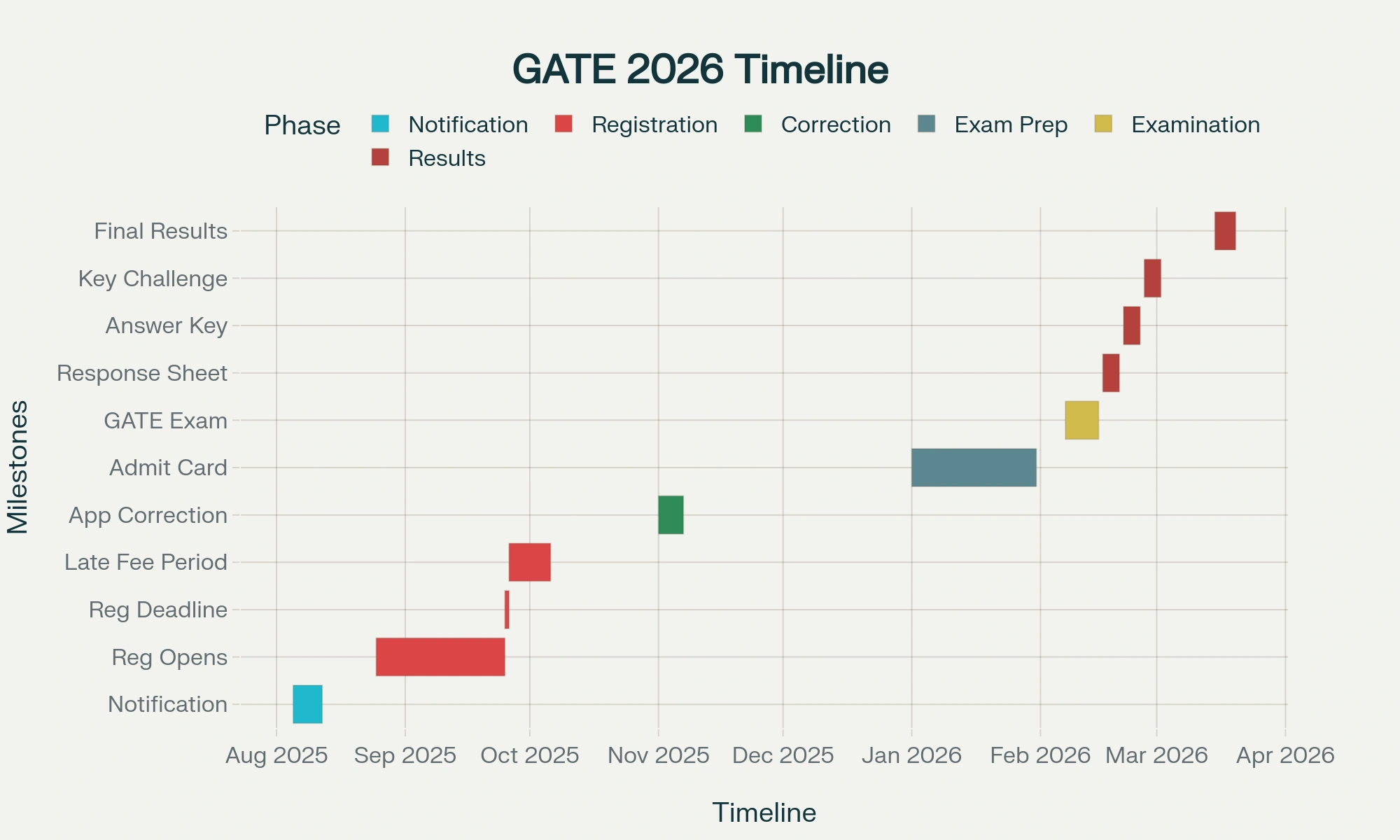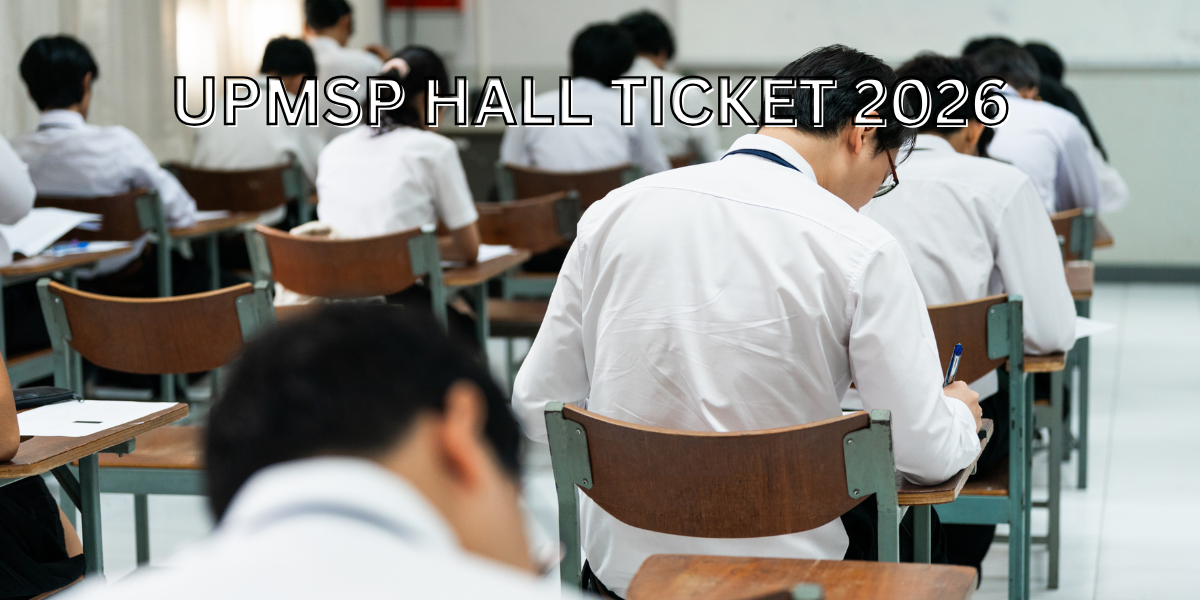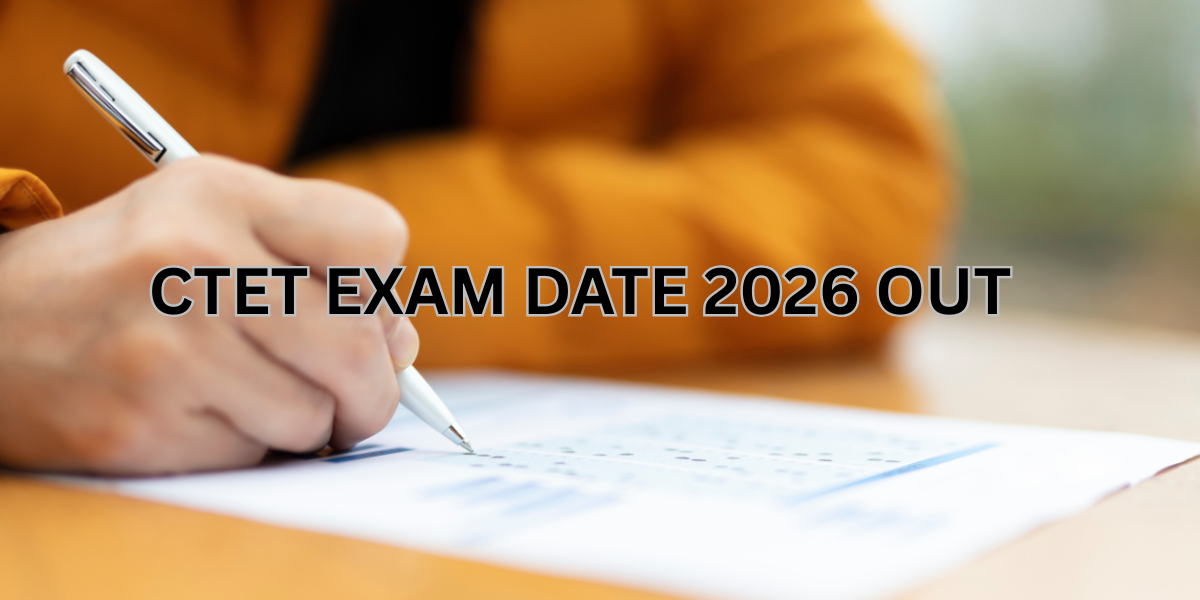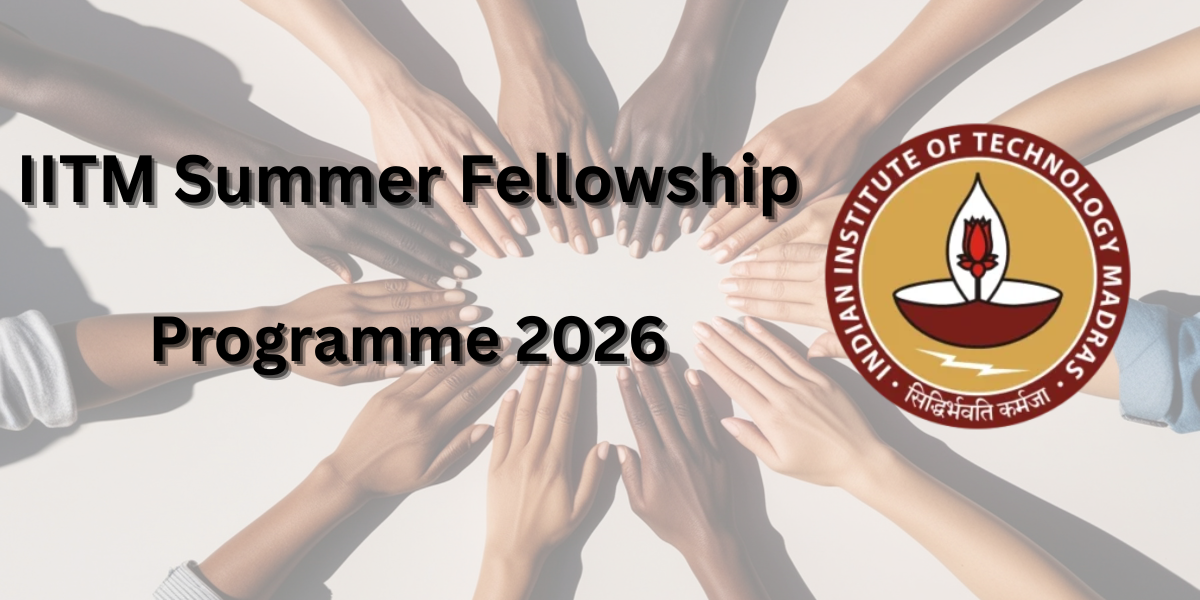The much-awaited GATE Exam Date 2026 has been officially announced by IIT Guwahati, marking a significant milestone for engineering aspirants across India. The Graduate Aptitude Test in Engineering (GATE) will be conducted on February 7, 8, 14, and 15, 2026, providing multiple opportunities for candidates to appear in this prestigious national-level examination. With registration opening on August 25, 2025, and a comprehensive eligibility framework that accommodates various academic backgrounds, GATE 2026 presents an enhanced pathway to premier postgraduate programs and lucrative Public Sector Undertaking (PSU) careers.
Complete Schedule and Important GATE Exam Date 2026
The GATE 2026 examination schedule has been meticulously planned to ensure adequate preparation time for candidates while maintaining the exam’s rigorous standards. IIT Guwahati, serving as the organizing institute, has released a comprehensive timeline that spans from August 2025 to March 2026.

Registration and Application Timeline
The GATE 2026 registration process begins on August 25, 2025, through the Graduate Online Application Processing System (GOAPS). Candidates have until September 25, 2025, to submit their applications without any late fees. However, an extended registration period is available until October 6, 2025, with additional charges.
The application correction window will open in the first week of November 2025, allowing candidates to modify limited fields in their submitted applications. This facility provides flexibility for candidates who need to update specific information after their initial submission.
Examination Schedule and Format
The GATE exam date 2026 will be conducted over four days with two sessions each day – a forenoon session from 9:30 AM to 12:30 PM and an afternoon session from 2:30 PM to 5:30 PM. This Computer-Based Test (CBT) format ensures standardized evaluation while accommodating the large number of candidates across the country.
The examination will feature 30 test papers covering diverse engineering and science disciplines, with candidates allowed to appear for either one or two papers from selected combinations. Each paper carries a total of 100 marks and has a duration of 3 hours, testing candidates’ knowledge across General Aptitude (15 marks), Engineering Mathematics (13 marks for applicable papers), and subject-specific questions.
Results and Post-Exam Activities
GATE 2026 results will be declared on March 19, 2026, followed by the availability of scorecards for download in March 2026. The scorecard remains valid for three years, providing candidates with flexibility in planning their academic and professional pursuits.
Comprehensive Eligibility Criteria
The GATE exam date 2026 eligibility criteria have been designed to be inclusive while maintaining academic rigor. The examination is open to candidates who are currently in their third year or higher of any undergraduate degree program, or those who have completed government-approved degree programs in Engineering, Technology, Architecture, Science, Commerce, Arts, or Humanities.
Academic Qualifications
Engineering and Technology students pursuing B.E./B.Tech./B.Pharm. degrees (4 years after 10+2 or 3 years after B.Sc./Diploma) who are currently in their third year or higher, or have already completed their programs, are eligible. Similarly, Architecture students in five-year B.Arch., four-year Naval Architecture, or four-year Planning programs can apply from their third year onwards.
Science graduates including B.Sc. (Research)/B.S. degree holders from four-year programs after 10+2 are eligible from their third year. Professional degree holders like Pharm.D. candidates (six-year program after 10+2) can apply from their third year onwards, while M.B.B.S./B.D.S./B.V.Sc. students are eligible from their fifth semester or higher.
Postgraduate and Professional Qualifications
Master’s degree holders in any branch of Arts, Science, Mathematics, Statistics, Computer Applications, or equivalent programs can apply from their first year or after completion. The eligibility extends to candidates in Integrated M.E./M.Tech. programs, both post-B.Sc. (four-year programs) and five-year integrated programs after diploma or 10+2.
Professional society examinations equivalent to B.E./B.Tech./B.Arch., recognized by Ministry of Education/UPSC/AICTE (such as AMIE by Institution of Engineers-India), are accepted provided candidates have completed Section A or equivalent. Additionally, B.Sc. (Agriculture, Horticulture, Forestry) students from four-year programs are eligible from their third year.
Special Provisions
International candidates who have obtained or are pursuing their qualifying degree from countries other than India must be in their third year or higher, or have completed their Bachelor’s degree of at least three years duration in relevant fields. Importantly, there is no upper age limit for GATE 2026, making it accessible to working professionals and candidates of all ages.
Application Process and Fee Structure
The GATE exam date 2026 application process is entirely online through the GOAPS portal, ensuring transparency and efficiency. The application fee structure has been revised for 2026, reflecting adjustments in examination costs while maintaining accessibility for different candidate categories.
Fee Structure Details
Female candidates, SC/ST candidates, and Persons with Disabilities (PwD) benefit from concessional fees of ₹1,000 per paper during the regular period (August 25 to September 25, 2025). For the extended period (September 26 to October 6, 2025), these categories pay ₹1,500 per paper.
All other candidates, including foreign nationals, are required to pay ₹2,000 per paper during the regular period and ₹2,500 per paper during the extended period. These fees represent an increase from the previous year, with regular period fees rising from ₹900 to ₹1,000 for reserved categories and from ₹1,800 to ₹2,000 for general categories.
Application Guidelines
Candidates must ensure they submit only one application form, as multiple applications will result in rejection of all but one without fee refund. The application requires uploading of specific documents including a recent photograph (80% face coverage), signature in black ink on white paper, and relevant educational certificates.
Payment can be made through multiple online modes including net banking, credit card, debit card, or UPI for Indian candidates, while international candidates can use credit cards or PayPal. Candidates are advised to retain payment receipts and download their application forms for future reference.
Examination Pattern and Syllabus Overview
The GATE 2026 examination pattern maintains the established Computer-Based Test format while introducing refinements to enhance the testing experience. Each paper consists of 65 questions distributed across General Aptitude and subject-specific sections, designed to test recall, comprehension, application, and analysis & synthesis abilities.
Question Types and Marking Scheme
The examination features three types of questions: Multiple Choice Questions (MCQ), Multiple Select Questions (MSQ), and Numerical Answer Type (NAT) questions. Questions carry either 1 mark or 2 marks, with a negative marking scheme applied only to MCQs – 1/3 mark deduction for wrong 1-mark answers and 2/3 mark deduction for wrong 2-mark answers.
General Aptitude (GA) is common across all papers and carries 15 marks, testing quantitative aptitude and verbal ability. For most engineering papers, Engineering Mathematics contributes 13 marks, while the remaining 72 marks focus on subject-specific content. However, papers like Architecture (AR), Chemistry (CY), Data Science & Artificial Intelligence (DA), and others have modified distributions with GA carrying 15 marks and subject questions carrying 85 marks.
New Developments in GATE 2026
A significant addition to GATE 2026 is the introduction of Energy Science (XE-I) as a new sectional paper under the Engineering Science (XE) paper. This reflects the growing importance of sustainable energy technologies and provides specialized assessment opportunities for candidates in this emerging field.
The examination continues to offer two-paper combinations for candidates seeking to demonstrate proficiency in multiple disciplines, with specific permitted combinations available for different engineering branches. This flexibility allows candidates to showcase broader technical competencies while maintaining examination integrity.
Career Opportunities and Benefits
GATE qualification opens multiple career pathways, serving as a gateway to prestigious postgraduate programs and high-paying government positions. The examination’s significance extends beyond academic admissions to encompass recruitment opportunities in India’s leading Public Sector Undertakings.
Postgraduate Admission Opportunities
GATE-qualified candidates gain access to M.Tech, M.E., and direct Ph.D. programs in premier institutions including IITs, NITs, IIITs, and IISc, often with financial assistance through government scholarships. The Ministry of Education provides stipends of ₹12,400 per month for GATE-qualified master’s degree students, representing a 56% increase from previous rates.
Beyond government institutions, private sector opportunities abound for GATE-qualified professionals, particularly in research and development roles within multinational companies. The examination’s rigorous standards make GATE scores valuable credentials for technical positions across various industries.
PSU Recruitment Prospects
Public Sector Undertakings including BHEL, IOCL, ONGC, NTPC, GAIL, and numerous others recruit engineers directly through GATE scores. These positions offer attractive salary packages, job security, and comprehensive benefits including housing allowances, medical facilities, and retirement provisions.
The three-year validity period of GATE scorecards provides candidates with flexibility to explore multiple opportunities without immediate pressure to utilize their scores. This extended validity enables strategic career planning, allowing professionals to gain experience before pursuing higher education or explore various PSU opportunities as they become available.
International Recognition
International universities, particularly in Germany and Singapore, recognize GATE scores for admission to master’s programs. Institutions like Nanyang Technological University (NTU), National University of Singapore (NUS), and RWTH Aachen University accept GATE credentials, providing pathways to global educational opportunities.
Preparation Strategy and Resources
Effective GATE preparation requires strategic planning, particularly for working professionals and final-year students who must balance multiple commitments. Success in GATE 2026 depends more on consistent, focused study rather than extended preparation periods, with many toppers achieving excellent results within 6-8 months of dedicated preparation.
Subject Prioritization and Time Management
Core subjects with high weightage should receive priority attention, with candidates advised to focus on 80-85% syllabus mastery rather than attempting complete coverage. Analyzing previous years’ papers helps identify frequently tested topics and optimal resource allocation strategies.
Working professionals benefit from mobile learning applications and recorded video lectures that accommodate irregular schedules. Dedicating 2-3 hours daily during weekdays and longer sessions during weekends can provide adequate preparation time when combined with effective resource utilization.
Recommended Study Resources
Standard textbooks combined with GATE-specific preparation materials offer optimal preparation support. For Computer Science, recommended resources include “Architecture” by Hamacher, “Algorithm” by Cormen, “Operating System” by Galvin, and “TOC – Theory of Computation” by Ullman.
Online platforms providing structured courses, practice questions, and mock tests enhance preparation efficiency. YouTube channels by established educators, mobile learning applications for practice, and comprehensive test series with detailed analytics support diverse learning preferences and schedules.
Mock Tests and Practice Strategy
Regular mock test practice simulates exam conditions while building time management skills and mental stamina. Candidates should attempt full-length tests monthly, followed by thorough analysis of performance patterns and mistake identification.
Previous years’ question papers provide invaluable insights into question patterns and difficulty levels. Solving the last 10-15 years’ papers helps candidates understand recurring topics and develop effective answering strategies for different question types.
Latest Updates and Important Considerations
IIT Guwahati’s role as the organizing institute brings fresh perspectives to GATE 2026 administration while maintaining the examination’s established standards. The institute has implemented several enhancements to improve candidate experience and examination efficiency.
Technological Enhancements
The GATE 2026 official website and GOAPS portal have been upgraded to handle increased traffic and provide improved user interface. These technological improvements ensure smoother registration processes and better accessibility for candidates across diverse geographical locations.
Computer-Based Test infrastructure continues to expand, with examination centers distributed across eight IIT zones to ensure accessibility. The multi-session format across four days provides flexibility while maintaining examination security and standardization.
Policy Updates and Regulations
Application fee revisions reflect current examination administration costs while maintaining concessional rates for deserving categories. The fee structure balances accessibility concerns with operational requirements, ensuring sustainable examination delivery.
Document verification requirements have been streamlined to reduce candidate burden while maintaining academic integrity. Clear guidelines regarding photograph specifications, signature requirements, and educational certificate uploads help candidates avoid application rejection due to technical issues.
The GATE Exam Date 2026 examination represents a crucial opportunity for engineering aspirants to advance their academic and professional careers. With comprehensive eligibility criteria, strategic preparation approaches, and diverse career opportunities, GATE continues to serve as India’s premier gateway to technical excellence. Candidates are encouraged to begin their preparation early, utilize appropriate resources, and maintain consistent study schedules to maximize their success prospects in this competitive examination.
Read also: CAT 2025 Exam Date Announced






